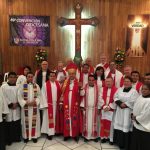As Christians, we reach out to and care for those who are in need just as Jesus did. As we know from the headlines, there is a ever-present need for help and support for refugees that is greater than ever before. Episcopal Migration Ministries, a program of The Episcopal Church, is a great resource to learn how you or your congregation can help to care for and welcome refugees here at home, while creating a community that is rooted in compassion and understanding.The following is a message from Episcopal Migration Ministries about their work:
There are over 65 million forcibly displaced people in the world today, the highest level ever recorded. 21 million are refugees. Over half of all refugees are children. Episcopal Migration Ministries (EMM) is The Episcopal Church’s refugee resettlement agency, saving lives and restoring hope for thousands of refugees resettled to the United States every year. They need our help to continue this work. Stand with Episcopal Migration Ministries and Stand to Support Refugees. To learn more about EMM and how you can help, visit www.episcopalmigrationministries.org. Find EMM on social media: facebook.com/EMMRefugees, Twitter & Instagram: @EMMRefugees.
To donate to support this ministry, visit bit.ly/EMMDonation or donate by check, payable to Episcopal Migration Ministries, 815 Second Avenue, New York, NY 10017. [Episcopal Migration Ministries]
If your church community is interested in fostering connections with the refugee community in your area, Episcopal Migration Ministries recommends several ways of doing so:
Have Interfaith conversation and prayer for refugees, within your community.
Conversations at coffee hour, panel discussions after services, or presentations on a weeknight. However your church goes about opening your hearts and your doors to refugees and members of other faiths, the important thing is that the conversations are thoughtful and happening, with the goal of bringing community together to support refugees.
Break bread together.
Food is a great connector of all people across the world. Sharing a meal together can help to break down those walls that keep us from those who we feel are different from us. Hosting an interfaith Iftar, is a wonderful way to bring toghether Christians with their Muslim brothers and sisters. EMM offers one piece of advice when planning an Iftar. Be sure to include your Muslim partners in the planning process. The following two resources can help you in your effort:
Shoulder to Shoulder Interfaith Iftar Guide
Host a World Refugee Day or Interfaith Event.
Some of the best resources on this include:
RCUSA 2017 World Refugee Day Toolkit
Welcoming America World Refugee Day Toolkit
Justice for Immigrants 2017 World Refugee Day Toolkit
Use Social Media to get your word out.
As always, social media is a great way to get your message outabout refugees, World Refugee Day, and any event that you would like to have in your community.
Some of the EMM hashtags you can use are #StandTogether #WithRefugees #WRD2017. You can also tag EMM at @emmrefugees. For events local to you, make your hashtags easy to understand, and remember that tagging community members and organizations is a great way to get the word out.
Review Scripture from all faiths and highlight our shared calling.
The call to “welcome the stranger,” through protection and hospitality, and to honor the stranger or those of other faiths with respect and equality, is deeply rooted in all major religions.
There are tens of millions of refugees and internally displaced people in the world. Our faiths ask us to remember we are all migrants on this earth, journeying together in hope.
Christian Scripture“For I was hungry and you gave me food, I was thirsty and you gave me something to drink, I was a stranger and you welcomed me” (Matthew 25:35)
“Let mutual love continue. Do not neglect to show hospitality to strangers, for by doing that some have entertained angels without knowing it.” (Hebrews 13:1-3)
Islamic Scripture“Do good unto your parents, and near of kin, and unto orphans, and the needy, and the neighbor who is a stranger, and the friend by your side, the wayfarer, and your servants.” (Qur’an 4:36)
“Those who give asylum and aid are in very truth the believers: for them is the forgiveness of sins and a provision most generous.” (Qur’an 8:43)
Jewish Scripture“The stranger who resides with you shall be to you as one of your citizens; you shall love him as yourself, for you were strangers in the land of Egypt.” (Leviticus 19:33-34)
“You shall not oppress the stranger, for you know the soul of the stranger, having yourselves been strangers in the land of Egypt.” (Exodus 33:1)[Episcopal Migration Ministries]
Review and discuss Welcoming the Stranger, Affirmations for Faith Leaders Document with your community.
In 2013, a coalition of leading faith-based humanitarian organizations and academic institutions drafted UNHCR’s document “Welcoming the Stranger: Affirmations for Faith Leaders.” Faith groups around the world have used the Affirmations to foster support for refugees and other displaced people in their communities.
EMM will ask our guests to look to the affirmations as inspiration to “welcome the stranger” with dignity, respect, and loving support. Each guest will receive a copy of The Affirmations to take with them. [Episcopal Migration Ministries]


